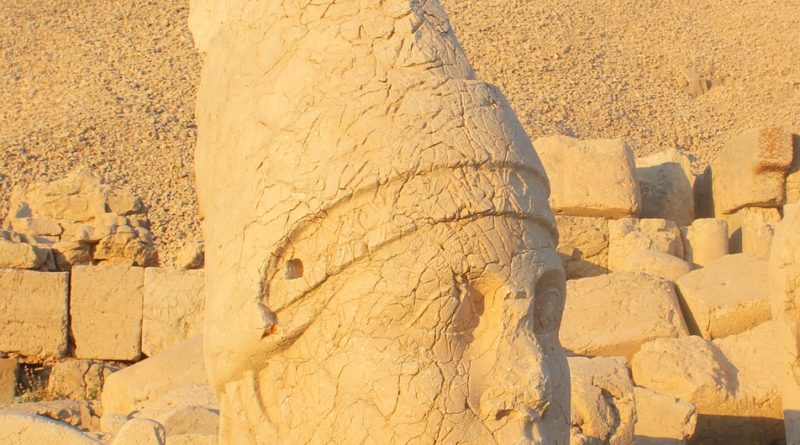The Nimrod Enigma
By Derek Gilbert
Many of us were taught that because the Tower of Babel was at Babylon, Nimrod is the villain responsible for the evil associated with that city.
That sounds right; the names are close enough that it seems like a no-brainer to connect the two. However, history is a harsh mistress. Getting it right means digging a little deeper than finding two names that sound alike.
The Bible tells us that the kingdom of Nimrod had its beginnings at “Babel, Erech, Accad, and Calneh, in the land of Shinar,” according to Genesis 10:10.
Shinar, of course, was Sumer, home of the first civilization on earth to produce writing and the first advanced civilization to emerge on the earth.
Shop Amazon – Top Rated in Electronics
However, as I argue in The Great Inception, drawing on the work of Egyptologist David Rohl, the Tower of Babel was the temple of Enki at the ancient city of Eridu. That city was remembered by Sumerians as the first one ever built, and evidence suggests it may even be the city built by Cain.

Erech is Uruk, in what is now southeastern Iraq. Accad was the city from which Sargon the Great conquered all of Mesopotamia around 2334 B.C., making him the first Semitic ruler of the ancient Near East. That city hasn’t been found, but it’s believed to have been on the Tigris River somewhere near modern Baghdad and may even be beneath Baghdad itself, according to a 1990 article in the Journal of Near Eastern Studies, “An Areal Location of Agade,” by C. Wall-Romana.
The Nimrod-Sargon Mystery

Sargon is also credited with being the world’s first empire-builder, but that’s only because historians generally don’t believe Nimrod was a historic character. (Sargon is one of the candidates put forward as the basis of the Nimrod “legend.”)
Calneh likewise hasn’t been found, but the name may be a misreading of a Hebrew phrase that simply meant “all of them.”
So, the original sentence might have read, “the beginning of his kingdom was Babel, Erech, and Accad, and all of them were in the land of Shinar,” according to a 1944 article in the Journal of Near Eastern Studies, “The End of ‘Calneh in Shinar,’” by W. Albright.
From there, we’re told Nimrod went to Assyria, or northern Mesopotamia, and built Nineveh, Rehoboth-Ir, Calah, and Resen, according to Genesis 10:11–12. In other words, those two verses in Genesis 10 are a condensed history of a man who’s cast a shadow across five thousand years of history.

Because you’re paying attention, you’ve noticed that the modern state of Iraq bears the name of Nimrod’s kingdom, Uruk.
In short, sometime after the Flood but before the first written records in Sumer, a king from the city of Uruk extended his reach north and west in the Fertile Crescent at least as far as what is now the Kurdish regions of northern Iraq and northeastern Syria.
Was Nimrod’s Uruk the World’s First Empire?

Secular scholars and historians know that the city-state of Uruk dominated the ancient Near East during most of the fourth millennium B.C., roughly between 3900 and 3100 B.C. They call this period the Uruk Expansion.
Pottery from Uruk has been found as far away as the ancient city of Hamoukar in northern Syria, nearly 450 miles to the northwest. In 2005, archaeologists digging at Hamoukar discovered that the city had been destroyed during a violent attack by an army from Uruk around 3500 B.C., according to the story, “New Discoveries Hint at 5,500 Year Old Fratricide at Hamoukar, Syria,” in The Independent.

Bear in mind that an army on foot had to march about thirty days straight to cover that distance, assuming there were no interruptions along the way to forage for food or fight other people who objected to their passage.
In other words, it was a powerful leader with a disciplined army who pulled off that mission. This battle wasn’t a raid on the next town over; it was an organized military campaign.
Nimrod’s Uruk, not Sargon’s Akkad, was the world’s first empire.
This doesn’t prove that Nimrod lived in the fourth millennium B.C., but it’s the most logical time period for his career, and it fits the Bible’s account. That’s why he had nothing to do with Babylon.
Was Nimrod the Ruler of Babylon?

You see, Babylon didn’t exist until the time of Sargon, around 2300 B.C., but even then, it was an unimportant village on the Euphrates for another four hundred years. Finally, around 1894 B.C., an ambitious Amorite chieftain named Sumu-Abum started Babylon on its path to greatness by expanding his influence at the expense of a neighboring city-state.

Still, Babylon was little more than an independent city for the first century or so of its existence. The first four rulers of Babylon didn’t even call themselves kings. It wasn’t until about 1800 B.C., the reign of Hammurabi’s father Sîn-Muballit, that Babylon began to expand.
Not that Nimrod was a good guy, you understand.
You have to transgress pretty seriously for God to descend from Heaven for a personal intervention.
In our next installment, we’ll examine the reasons God may have had for putting a stop to Nimrod’s construction project.


Derek Gilbert hosts SkyWatchTV, a weekly Christian television program, and co-hosts SciFriday, a weekly television program that looks at science news with his wife, author and analyst Sharon K. Gilbert. His broadcast career spans nearly four decades, with stops in Little Rock, Saint Louis, and Philadelphia, and he’s been interviewing guests for his podcast, A View from the Bunker, since 2009. Derek is author of the groundbreaking books The Great Inception and Last Clash of the Titans. He’s also the co-author with Josh Peck of The Day the Earth Stands Still, which exposes the occult origins of the modern UFO phenomenon. His latest book, Bad Moon Rising: Islam, Armageddon, and the Most Diabolical Double-Cross in History was just released. Derek and Sharon are currently writing Profiling the Dead, about ancient death cults and the Bible, which should be out in late 2019. Derek is a popular conference speaker, a lifelong fan of the Chicago Cubs, prefers glasses to contacts, and has been known to sing the high part in barbershop and gospel quartets. Find out more at www.derekgilbert.com, www.gilberthouse.org, www.vftb.net, or www.SkyWatchTV.com. Follow him at Facebook.com/DerekGilbert or on Twitter @DerekGilbert.



